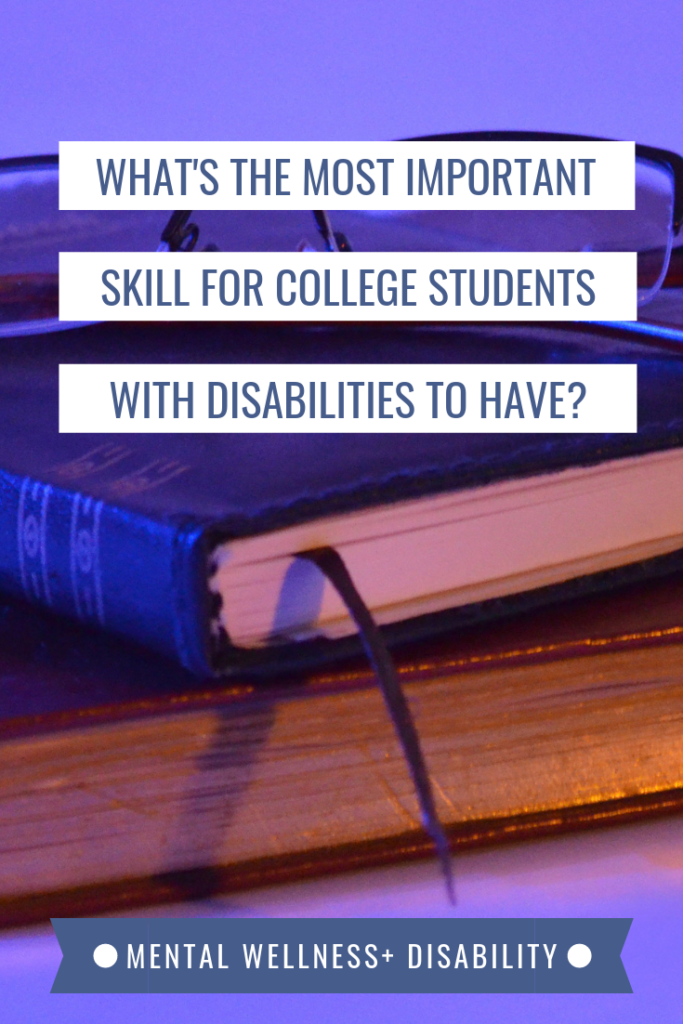What changes between high school and college for students with disabilities?
The supports they get.
Over 90% of high school students with disabilities receive specialized supports and accommodations in the classroom. Yet only 17% of college students who identify as having a disability are getting any kind of formalized supports.
Why the big drop?
It’s not that colleges don’t have disability resources. Colleges and universities are, for the most part, required to make reasonable modifications for people with disabilities.
What’s happening is that college students with disabilities are just like all other college students; they want to prove that they are independent! A seemingly easy first step is to try to ‘go it alone’, without the assistance that they got in high school.
And I get it…they’re done! With IEP meetings and extra tutoring and taking tests in separate rooms. They’re ready to leave that stuff in the past and be just like everyone else.
I’ve worked with many counseling clients with developmental disabilities who were preparing to transition to college. I encouraged them all to see that, disability label or not, every student has challenges they need to overcome if they want to succeed.
That’s why I tell college-bound students with disabilities that the number one skill they must take with them to college is this:
To be able to quickly and comfortably describe their needs to someone else. To have, if you will, an elevator pitch of yourself and your needs.
Why is this the most important skill for college students with disabilities to have?
Suppose you have declared yourself as a student with disabilities to the Disability Resource Office. It varies depending on the school, but in many cases this will only alert your professor that someone in his or her class has a disability. Your professor won’t know who it is or what they need.
It will be up to you to tell them that you have a disability.
It will also be up to you to ask for the specific accommodations that will help you be successful in their class.
There are other times when being able to quickly describe what you need will be tremendously helpful, such as when:
- Introducing yourself to your new roommate or lab partner or study group
- Accepting an internship offer
- Signing up for a club or other activity group
When I first ask my clients to describe their disability as they would if they were asking a professor for accommodations, it typically sounds like this:
“I’m Jessie and I have Autism. Autism is when people have issues with sensory processing and communication….” and then they stop and realize they aren’t sure where to go next. If that’s where you’re at right now, that’s ok!
The first sentence is great, I wouldn’t change a thing.
What’s not so good about the second sentence is that you’re describing general truths about Autism. Yes, people with Autism typically have difficulties processing sensory input and communicating with others.
But two people with Autism who both have sensory processing and communication difficulties can look VERY different from each other!
Remember; the only reason that you’re disclosing anything is to get support that will be helpful to you.
YOU are the point.
Rather than describing what’s true for most people with Autism (or any other disability), really focus on talking about specifics, like:
- Things that are difficult for you
- Strengths that you have that help you compensate for your needs
- Things that you and/or other people do that help you get through what’s difficult for you
Now, time to practice
So, it might sound like this:
“I’m Jessie and I have Autism. Sometimes I have a hard time keeping eye contact when I’m talking to someone, so, I don’t mind if you remind me to look at you when we’re talking. I can also get distracted by lights, so, sometimes I may wear sunglasses during class, because this helps me pay attention.”
If you’d rather not label yourself with a specific diagnosis, just make this small change:
“I’m Jessie. Sometimes I have a hard time keeping eye contact when I’m talking to someone, so, I don’t mind if you remind me to look at you when we’re talking. I can also get distracted by lights, so, sometimes I may wear sunglasses during class, because this helps me pay attention.”
If you’re still feeling like you’d rather try to get through college on your own, without any accommodations, consider this: you can disclose your disability to the disability services office, and then decide as time goes by if you want to disclose to your professors.
Remember:
There will be a deadline by which you HAVE to disclose to the campus disability services office, and if you don’t, you lose the opportunity to have supports for the rest of the semester.
Most of my clients have found that they like having the ‘safety net’ of having disability services available to them, whether or not they choose to talk with their professors, classmates, or others about their unique needs.
It will probably feel very strange to talk about yourself so directly with someone you don’t know well. Even knowing that you’re doing it to help yourself succeed in college doesn’t make it any less awkward!
What can make it easier is practice. Practice introducing yourself this way every chance you have that it makes sense to do so. If you are meeting any of the following for the first time, it can be a great opportunity to practice your new self-introduction:
- Teachers
- Coaches/Tutors
- Doctors/Nurses/PA’s/Etc.
- Religious leaders
- Employers
- Support Workers
I certainly don’t mean to imply that this is the ONLY skill that college students with disabilities need. Time management, independent living, personal care, coping, and social skills are all essential for students with disabilities to master.
But, I believe that having a strong sense of who you are, what you’re good at, and how you are best supported is a very essential skill for all collegians, whether or not they’re diagnosed with a disability.
What’s been your experience? Is it helpful to have a ‘quick pitch’ of your strengths and needs? How did you get comfortable talking about yourself in this way? I would love for you to share your experiences so that others can learn from them!
Keep reading
Other posts you may be interested in
How to Know if Someone is a Real Friend. A Quiz for Teens and Adults with IDD.
In my counseling practice, I offer mental health counseling for teens and adults with IDD. Many of my clients who have Down syndrome, Cerebral palsy, and other disabilities have lots of meaningful friendships in their lives. But sometimes, they ask “how can I know if someone is a real friend?” Maybe you have a friend […]












